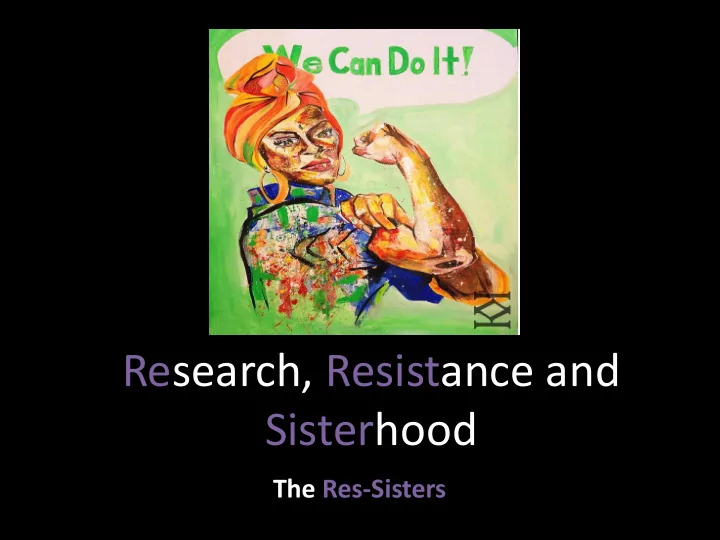

Research, Resistance and Sisterhood The Res-Sisters
The Res-Sisters • Documenting pains and pleasures • Re search, resist ance, and sister hood • Range of positions • A collective endeavour • Challenge and change
The Res-Sister Manifesta 1. Embrace collectivity and nurture allies 2. Little acts of solidarity make a big difference 3. Speak out 4. Recognise your power and privilege 5. Self-care is a must Have fun!
The Spirit of ‘Fat Cat Sociology’: Pre -defined and Redefined in ‘Public Sociology’?
Misrecognition and forgotten histories ‘While contemporary debates about public sociology and calls on and by academics to take their work ‘out’ have been dominated and represented by mainly male academics – figuring as the ‘public intellectual’ par excellence – there is a longer but often hidden history of feminist labour and will to engage beyond academic walls’ (Quinn et al 2011 in Taylor and Addison). • Rich (hidden) histories of ‘engaging’ beyond the academy by feminist and black academics • Theorising vs. Doing public sociology? The gendering of the public intellectual
Academia’s housewives? • ‘Institutional housekeeping’ and undervalued labour (Bird et al 2004); academic chores and academic capital (Heijstra et al 2015); prestige economy (Coate 2014) • Who has control over their time? What is the distribution of ‘chores’ within the neoliberal academy? • The behind the scenes ‘admin’ and emotional labour of facilitating dialogue and engaging ‘publics’ • A story: Angry men and mediating mothers
Performing impact, engaging users, animating debate: (Hidden) costs , (hidden) injuries? ‘A sense of personal and social crisis is now endemic and deeply felt amongst many academics, even those for whom ‘ precarity ’ does not take the most obvious forms. We have collectively become a mobile, agile, flexible workforce par excellence, prepared to move and relocate cities or countries in order to work, responding with ‘hair trigger responsiveness’ (Thrift, 2000) to new calls for papers, new funding streams, new potential areas of student demand, and to fit in and reinvent ourselves for every changing fashion on engaging ‘research users’ and developing ‘impact ’ . But this has exacted a huge cost physically, socially and psychically n producing new forms of injury. ’ (Ros Gill 2010)
Who is centre and who at the periphery when it comes to defining legitimate knowledge? (Spivak, 1995) Debates about ‘Public Sociology’ risk reproducing existing hierarchies and practices of value attribution within academia which are gendered, classed and raced. By forgetting these histories and not recognizing the distribution of labour that enables ‘engaging and impacting’ we risk further embedding inequities and injustices in who gets to occupy the position of the (public) intellectual
Embodying the Public Sociologist:
The Scholar Denied: who has the authority to speak? • Voices that count • Voices that are silenced
The Personal Sociologist: Doing Academia Differently • Collective resistance • Little acts of solidarity • Engaging with people as ongoing public sociology • Sociology as everyday practice not just public research
Clean Narratives, Messy Realities: Revisited
The Value of Collective, Feminist Sociology (public or otherwise)
Recommend
More recommend